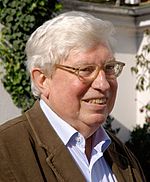About Gerhard Ertl
- Gerhard Ertl (born 10 October 1936) is a German physicist and a Professor emeritus at the Department of Physical Chemistry, Fritz-Haber-Institut der Max-Planck-Gesellschaft in Berlin, Germany.
- Ertl's research laid the foundation of modern surface chemistry, which has helped explain how fuel cells produce energy without pollution, how catalytic converters clean up car exhausts and even why iron rusts, the Royal Swedish Academy of Sciences said. His work has paved the way for development of cleaner energy sources and will guide the development of fuel cells, said Astrid Graslund, secretary of the Nobel Committee for Chemistry. He was awarded the 2007 Nobel Prize in Chemistry for his studies of chemical processes on solid surfaces.
- The Nobel academy said Ertl provided a detailed description of how chemical reactions take place on surfaces.
- His findings applied in both academic studies and industrial development, the academy said.
- “Surface chemistry can even explain the destruction of the ozone layer, as vital steps in the reaction actually take place on the surfaces of small crystals of ice in the stratosphere,” the award citation reads. In 2015, Ertl signed the Mainau Declaration 2015 on Climate Change on the final day of the 65th Lindau Nobel Laureate Meeting.
- The declaration was signed by a total of 76 Nobel Laureates and handed to then-President of the French Republic, François Hollande, as part of the successful COP21 climate summit in Paris.
Read more at Wikipedia
See Also
- Famous People's Birthdays on 10 October, Germany
- Famous People's Birthdays in October, Germany
- Famous physicist's Birthdays on 10 October, Germany
- Famous physicist's Birthdays in October, Germany
- Famous chemist's Birthdays on 10 October, Germany
- Famous chemist's Birthdays in October, Germany
- Famous university teacher's Birthdays on 10 October, Germany
- Famous university teacher's Birthdays in October, Germany


 Date of Birth:
Date of Birth:  Place of Birth: Stuttgart, Baden-Württemberg, Germany
Place of Birth: Stuttgart, Baden-Württemberg, Germany